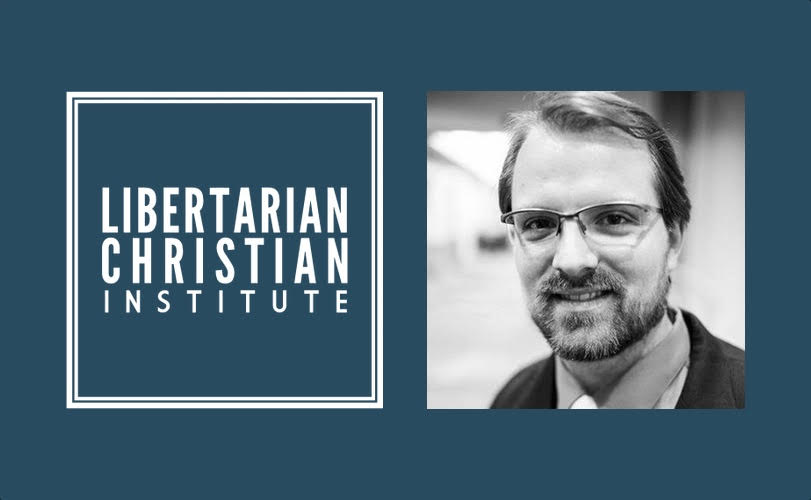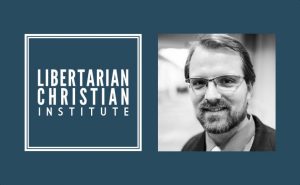Ep. 9 Norman Horn on Morality and Politics, Christianity and the Troops, and How a Christian Libertarian Handles Romans 13

 Norman Horn is the founder and president of the Libertarian Christian Institute. He and Bob have a provocative conversation that will enlighten both believers and skeptics alike. They critically analyze the tendency of American Christians to support war, in its domestic and foreign applications. Norman gives Bob the best, succinct analysis of Romans 13 he has ever encountered. Bob ends (playing devil’s advocate) by challenging Norman to explain why the Church isn’t just as exploitative as the State.
Norman Horn is the founder and president of the Libertarian Christian Institute. He and Bob have a provocative conversation that will enlighten both believers and skeptics alike. They critically analyze the tendency of American Christians to support war, in its domestic and foreign applications. Norman gives Bob the best, succinct analysis of Romans 13 he has ever encountered. Bob ends (playing devil’s advocate) by challenging Norman to explain why the Church isn’t just as exploitative as the State.Mentioned in the Episode and Other Links of Interest:
- Get Started at the Libertarian Christian Institute (LCI)
- The Libertarian Christian podcast
- LCI Mission page
- LCI Facebook page
- “The Biblical Foundations of Christian Libertarianism” (video)
- “New Testament Theology of the State” Part 1 and Part 2
- Mark Twain’s “War Prayer”
- “Theology Doesn’t Begin and End With Romans 13”
The sound engineer for this episode was Chris Williams. Learn more about his work at ChrisWilliamsAudio.com.

[…] Norman gives the best handling of this tricky subject I’ve yet heard. Plus we discuss all sorts of other stuff. […]
https://www.bobmurphyshow.com/ep-9-norman-horn-on-morality-and-politics/
I listened with great interest to Bob’s discussion with Dr. Norman Horn who is the founder and president of the Libertarian Christian Institute. Late in the discussion, Norman gives Bob a succinct 4 part analysis of Romans 13 in the Bible. His analysis positions God as the ultimate authority over the secular state in defining and enforcing public policy, taxation, obedience, etc.
My question to Bob and Norman is: With this interpretation of Romans 13, it suggests that a theocracy is preferred for the governance of all Americans and their institutions. How is this different that the theocracies in Islamic states that use the Qu’ran to express Allah as the ultimate authority other than the obvious difference that God and Allah’s earthly messengers held different values?
That’s not what they were suggesting at all. They were suggesting minimal gov with very small ammount of laws. And def dont legislate morality. Seems like u were listening to a completely dif pod
Interesting episode as always.
As far as drugs, just a thought: Leaving aside the issue of legality, I have yet to see a convincing argument, biblical or otherwise, for why the recreational use of any drug is *intrinsically* immoral. If the problem is “losing control”, by which I assume Norman meant addiction, then I would say that shows a misunderstanding of what addiction is. The neurological changes associated with compulsive behavior (a certain kind of synapse pruning, if I’m not mistaken) are almost identical whether it comes to binge eating disorder or alcohol use disorder or heroin use disorder or whatever. It’s not mere exposure to a substance that causes them. Rather, it’s continually acting in a compulsive way. And we know that some people are simply more impulsive than others, whether it’s due to genes or environment or whatever.
All else being equal, I’m more convinced that drug use is not inherently immoral than I am that they should all be legal for recreational use. I can at least see someone making a half-decent argument that prohibition of drugs will decrease the number of vulnerable people who have access to them, and as such, drug problems will be lower. In fact, I’ve seen some convincing arguments showing that Alcohol Prohibition was actually a success as alcohol-related problems decreased during them.
On the other hand, I expect a convincing argument for the inherent immorality of intoxication is not forthcoming.
Matjaz I agree with some of your statements. But even if one finds it immoral to allow people to use or even abuse drugs, prohibition does not actually solve these issues. After the first year of alcohol prohibition, usage did go down temporarily. After a year into the federal ban of the manufacture and creation of alcohol, usage rates returned to normal. And all booze actually became stronger, since prohibition created risks to the supplier of alcohol on the black market, it incentivized bootleggers to add impurities and increase potency in their product. Also, there were more speakeasies during prohibition than there were bars before prohibition. Keep in mind we now have more drug addicts today than we did before Nixon rekindled the war on drugs.
There are several areas of the Bible that I think allude to the fact that people should not get stoned. I will go to 1 Peter 5:8, where it says, “Be sober-minded; be watchful. Your adversary the devil prowls around like a roaring lion, seeking someone to devour.”
We need to be sober-minded so we don’t fall prey to the devil. It’s easier to be tempted in a state of non-sobriety. Therefore, putting yourself needlessly into a situation where you will become tempted is foolish and sinful.
Now, doesn’t mean that I think you cannot morally use drugs or alcohol in moderation. I think you can be “sober-minded” and a bit tipsy. But, if you are using them with the intention of becoming intoxicated, then you are using them incorrectly.
But, even if it were completely immoral, even to come in contact with it, I would not say that the government should ban it. It’s immoral for men to lust after women, but I don’t think, as the Muslim Theocracies practice, that women should therefore remain completely covered at all times by law.
Hi Robert/Bob Murphy. I am happy that you are doing this podcast. I will have to listen to the Godel episode 2-3 more times before I comment on it because, on first listen, I still do not see the significance.
Please do not apologize for being a nerd. You are a highly inspirational figure for other nerds. You have a unique ability to summarize these historical figures and I am excited to see where you will take this show.
[…] it out here, and many thanks to Bob for the wonderful […]